Relevant Overviews
- Content Strategy
- Online Strategy
- Online Community Management
- Social Media Strategy
- Content Creation & Marketing
- Digital Transformation
- Thinking tools
- Zettelkasten
- Fediverse
- Blockchain, Crypto, NFTs etc
- Innovation Strategy
- Surveillance Capitalism, Social media and Polarisation (Overview)
- Disinformation in the US 2020 elections
- Communications Tactics
- Productivity
- Social Web
- Media
- Politics
- Communications Strategy
- Science&Technology
- Business
Overview: Fediverse
This topic emerged from the 5th in a series of newsletters focused on #US2020 #disinformation. A major update in late 2022 followed my #twittermigration to Mastodon, and a smaller one a year later with the sudden deletion of my Mastodon server, followed by the arrival of Threads.
What?
Fediverse: collection of interoperable social networks built on Open Web standards. ActivityPub standard, for example, is used by (inter alia) Twitter-lookalike Mastodon and YouTube-lookalike PeerTube, and sometime in 2024 newcomers Bluesky and Threads (tbc!).
Unlike Twitter and YouTube, however:
- Mastodon/PeerTube are not owned and controlled by corporations. Anyone can launch and operate a Mastodon or PeerTube server, just like anyone can set up an email server and exchange emails with others using the email standard.
- The person who creates a server sets its rules (privacy, hate speech, etc).
- Users on any Mastodon/PeerTube server can not only interact with users on other Mastodon/PeerTube servers, they can interact across Fediverse platforms. For example:
- if Mastodon user A follows PeerTube user B, B’s PeerTube videos will appear in A’s Mastodon feed,
- user A can even comment on the video from within Mastodon, without visiting PeerTube or having a PeerTube account.
This would be like if my Twitter account followed someone's Facebook page, yet we could still interact seamlessly from our platform of preference. That’s impossible as Twitter & Facebook are walled gardens. Fediverse platforms like Mastodon and PeerTube are not – this is the Open Web on social.
See also: Tim Berners-Lee’s Solid, providing social media users with control over their data through personal knowledge graphs.
So what? New possibilities for new social platforms
While each Fediverse server is a community with its own rules, they're not walled gardens. This helps solve the vicious circle problem facing new platforms (why join a network where there are so few people on it? Hence noone joins it, so numbers stay low. So noone joins it): people don’t need to join the same social network, they just have to join any Fediverse network.
Reality check: Servers must be bidirectionally linked manually? Mastodon apparently suffers from "the singleton problem... [as it's] difficult to convince ... a major server to [federate] ... with a minor one... three Mastodon servers contain almost 60% of the known Mastodon population" - Peer-to-Peer Network Models and their Implications.
See also: adversarial interoperability - another part of the solution to this problem.
Let's do better
If progressives decamp, they should decamp to Fediverse alternatives.
The EU Institutions could help: by simply joining and posting to Fediverse platforms in addition to Facebook/Twitter, they could:
- encourage the emergence of alternatives to today’s toxic US platforms,
- add a new dimension to the EU's strategy towards them.
Return of the Splinternet?
Nevertheless, wide Fediverse adoption still requires a 'mass decamp'. There have already been a couple of false dawns.
US2020
Cue the US2020 elections, following which "US conservative leaders may have triggered the sort an en masse decamp that Facebook/Twitter alternatives require to take off".
However they're not moving to Fediverse platforms, so this may simply return us to the #splinternet (pre-platform social media), but with even more political polarisation.
2022 update: Elon Musk and the #TwitterMigration
Elon Musk's purchase of Twitter triggered a huge uptick of interest in Mastodon, leading me to finally take the plunge after 2 years of faffing about. I was optimistic (my first post was literally Welcome to the Fediverse, starry-eyed noob), but within a few months I'd discovered an unhappy truth: the current infrasructure simply doesn't deliver content properly reliably.
I'd point you to the mid-2022 toot where I pointed this out, but (as if to illustrate my point) it's gone: in November my server simply disappeared, taking all my content and connections with it, without warning. I managed to dig out a screenshot of that toot from my phone and include it in All my toots gone.
As can be seen from that post, by then I'd created a Bluesky account and was promptly followed by Satan. I haven't bothered since.
Also in 2022: just as I was writing a Fediverse strategy report for another EC department, the EU's Data Protection Supervisor and the EC's IT department launched social.network.europa.eu, the EU's own Mastodon server. The result was underwhelming to say the least, with accounts limited to the institutions, rather than the people working in them. Someone clearly never read Euan Semple's "Organisations don't tweet, people do", missing a huge opportunity that news organisations started embracing in 2022: setting up a Fediverse server for their journalists to prove that they are their journalists, not an imposter.
Soon afterwards the EU Bubble's own server - https://eupolicy.social/ - was launched. As I pointed out at the time, this had real potential:
it should be very easy for eupolicy.social to avoid creating a Brussels Bubble within the Fediverse. In the past I spent a lot of time exploring how us denizens of the Brussels Bubble could outreach to national conversations online. In the Fediverse, that’s upside down: rather than building bridges outwards, we can pull national conversations into the Bubble, simply by following the right people.
-Am I on the right Mastodon instance? (November 2022)
Back then they had 720 active accounts. 13 months later that had shrunk to 330. The EU's social.network.europa.eu has 18. It wasn't a good year.
Threads, Bluesky, and more
Literally one month after my Mastodon server disappeared, Instagram's "Twitter-killer" Threads arrived in Europe, announcing their intention - like Bluesky - to join the Fediverse, so I dug out my never-used Instagram account to kick the tyres.
As discussed during a ZNLive chat one week before, this should make 2024 at least potentially interesting:
- so far they should all use the same slogan: "We're like Twitter, but with none of your friends", so it's difficult to see people and organisations who rely on reaching an audience abandoning the incumbents anytime soon
- the hope is that their openness (if it happens) stimulates innovation in the wider Fediverse, so we get new forms of social media rather than more Twitter clones: there are already plenty of other ActivityPub-compatible networks, as well as alternative protocols like Nostr.
- all this could have huge implications for our own websites, where it might become both easier and more valuable to develop local communities of interest, networked into the wider Fediverse of decentralised social media, particularly with AI support.
---
Highlighted Resources tagged OR(#fediverse, #open web, #bluesky, #mastodon, #threads, #nostr) follow below:
Relevant resources
One of the snippets from a ZNLive interview I did in December 2023: "emerging social media platforms like Mastodon and Bluesky face a humorous yet real challenge - they're like "Twitter, but without your friends."With the European launch of Threads, the question arises: Can it offer a unique appeal to draw users? Will [they]...…

One of my favourite writers/thinkers on all things digital future is "finally, definitely, fully leaving X, and probably all social media..."
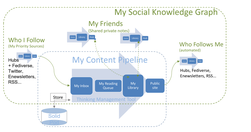
The second in my 1/1/2023 bundle of 5 posts exploring collective intelligence looks at the role of decentralised social networks: "A personalised, decentralised Social Knowledge Graph for each user multiplies the knowledge available to them via a trusted network of Followers and Friends, and creating collaborative possibilities more akin to w…
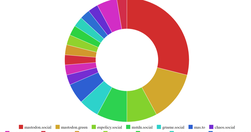
My second post following my personal #twittermigration: "the other users on your instance create its collective intelligence — the nearest thing you have to a content discovery algorithm".Not that I like algorithms, but "Apart from hashtags, ,,, your server’s Local and Federated timelines [are your] primary discovery channels when y…

Mastodon is "subtly designed to reduce the huge, viral surges of attention we see on Twitter" and others, which have "deformed people’s behavior... coaxed people to constantly try to hack the attentional marketplace... incessantly making posts ... operatically theatrical... enrage ... [other] high-voltage reaction".Hence “antiv…
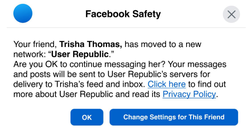
Those who've read Doctorow's books and blogs on the collective action problem stopping people leave the established social media walled gardens may not find anything new, except for the quite brilliant link he makes with "the 1971 film adaptation of Fiddler on the Roof ... the Anatevkans can’t just pack up and leave: they are being …
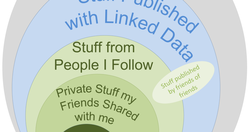
Writing a chapter for a book on Personal Knowledge Graphs made me rethink MyHub.ai, and led to a new collective intelligence pilot project with the founders of massive.wiki.

An overview of three protocols - ActivityPub, Scuttlebutt and Dat - and their complementary roles in helping redistribute power from "large centralized corporate interests and back into the hands of individual people and small groups... No one protocol [is enough] ... each protocol has its strengths and weaknesses". We need "develo…
Pretty good explanation of ActivityPub from Darius Kazemi: "ActivityPub describes ways for social network sites to talk to each other... [from] sites like Facebook, Twitter, YouTube, Snapchat... [to] New York Times ... Spotify. Basically any site where individual "users" create content and other people can subscribe to it could be A…

"it's a start... Musk argued that disclosing what amplifies or downranks tweets would reduce the risk of “behind the scenes manipulation.” [but] algorithms alone offer limited insights" because it's not just an algorithm that defines what you see: it's a huge dataset - "content that enters the platform, each user’s p…
I suspect this will be a canonical text for me moving forward with myhub.ai.Mike Caulfield in 2015, when my first hub was only about 2 years old, had also "been experimenting with another form of social media called federated wiki... instead of blogging and tweeting your experience you wiki’d it. And over time the wiki became a representation…

Interesting piece on the reverse side of the network effect: the more people leave, the faster the remainder leave. So what will make people leave?Gen Z want privacy, hate bullying/speech, don’t like ads and think "Facebook is for moms and grandparents""Millennials Are Ready to Ditch... too old to bicker with strangers... [and] stil…

One of a great series of Reimagining the Internet podcasts. Guest: the Planetary.Social founder, discussing:the early days of Twitter: "Twitter's innovation ... happened all at the edges... users created everything... inline images and short links and retweets and the app, actual at and hashtags... the company... cultivated this garden w…
Content moderation "will always end up frustrating very large segments of the population and will always fail to accurately represent the "proper" level of moderation of anyone".any moderation will upset the moderated no moderation will upset those who don't like spam, harassment, etcpushing moderation to the users puts th…
After pointing out that mainstream - ie centralised - social platforms cannot moderate effectively due to scale, then introduces fediverse/activitypub-based platforms. Will they face same moderation problems as the mainstream if/when they grow?Takes Gab's unsuccessful move into fediverse as an example: "Almost immediately, Gab was met by…

Given the myriad problems posed by social media platforms - content moderation, disinformation, censorship, privacy, anti-trust - this article "proposes an entirely different approach... that enables more free speech, while minimizing ... trolling, hateful speech, and large-scale disinformation efforts... also might help users ... regain cont…

"adversarial interoperability... create a new product or service that plugs into the existing ones without the permission of the companies that make them... once the driver of tech’s dynamic marketplace" now stifled by legal means by Big Tech, which "climbed the adversarial ladder and then pulled it up behind them".EFF sees re…
"corporate-run social media implies a structure [and]... content limits the users have no say in, which favor harmful [content] ... while inhibiting freedom of expression. ... the next platform has the same problems ... “I’ll just build my own platform” leads to ... “alt-tech” platforms ... to host right-wing extremist content... So what does…

Didn't know: "Prominent conservative donor Rebekah Mercer is among the company’s financial backers"Interesting point: one of the main reasons many are on FB/Twitter is to troll other people - will it be harder to get people to come back to an app where everyone agrees with them?
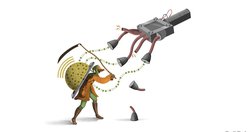
Overview of efforts to put data back into the hands of people. "platforms’ business models depend on network effects and scale to keep users engaged and to sell more advertising... a culture of virality that... poisons public discourse." Moreover, their data dominance is stifling competition & innovation. " So trustbusters are o…

Fleeting Note (FN): the creation of Fediverse-based alternatives might suddenly become an urgency.

"Our digital public sphere has been failing ... [but] History offers a proven template for how to build healthier public spaces."Filter Bubble author Pariser hearkens back to Walt Whitman's creation of NY's Green Park, when "New York City had no public parks ...only walled commercial pleasure gardens for those who could af…

In the US, radio began as a free-market free-for-all. More than five hundred radio stations sprang up in less than a decade to explore the possibilities... 40 percent were noncommercial... network of interlinked stations playing local and national content supported by local and national advertising, became dominant players...Soviet Union... ideolo…
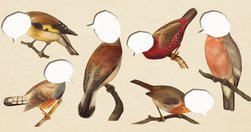
we’ve grown wary of the so-called attention econom... But we also benefit from social media and hesitate to disengage from it completely... a loose collective of developers and techno-utopians ... the IndieWeb ... developing their own social-media platforms... preserve what’s good about social media while jettisoning what’s bad... Facebook and I…

The web was designed to bring people together and make knowledge freely available. Everyone has a role to play to ensure the web serves humanity. By committing to the following principles, governments, companies and citizens around the world can help protect the open web as a public good and a basic right for everyone.

Facebook ... can never be, a platform where people have the power to build anything... the company’s main focus ... analyzing your data and showing you ads in exchange for advertiser’s money. A future where Facebook is the global social infrastructure, is a future with no refuge from advertising and number crunching... the future of social media …
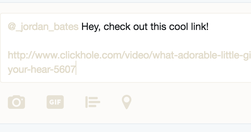
if you’re having a conversation with your friend, @person@custom.website, and another user from custom.website wants to chime in, they will be invisible.... how does one end up on this blacklist? ... mastodon.social’s community policy:... your social graph is not portable between platforms ... first principle of a workable, future-proof social ne…

when I saw the potential of the Internet, I thought it would be solved. The web would allow us to come together, not just across the world, but across the park, across racial lines, across our many divides... everything turned upside down. The open communication network we thought we were building turned into a hunting ground for trolls and spamme…
My first subscribers, surveyed last week, were equally split between the diverse formats and styles of my first four editions, so here’s a 5th.
What does the rise of digital distributors mean for the Open Web?... is there a point at which distributors create enough value for publishers to stop having their own websites? If distributors are capturing market share because of a superior user experience, is there a future technology that could disrupt them? And the ultimate question: who will…
Relevant Overviews
- Content Strategy
- Online Strategy
- Online Community Management
- Social Media Strategy
- Content Creation & Marketing
- Digital Transformation
- Thinking tools
- Zettelkasten
- Fediverse
- Blockchain, Crypto, NFTs etc
- Innovation Strategy
- Surveillance Capitalism, Social media and Polarisation (Overview)
- Disinformation in the US 2020 elections
- Communications Tactics
- Productivity
- Social Web
- Media
- Politics
- Communications Strategy
- Science&Technology
- Business